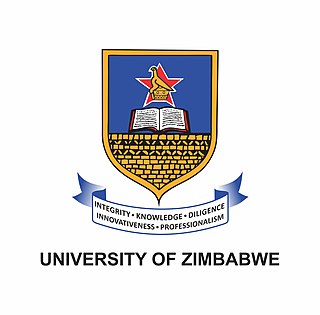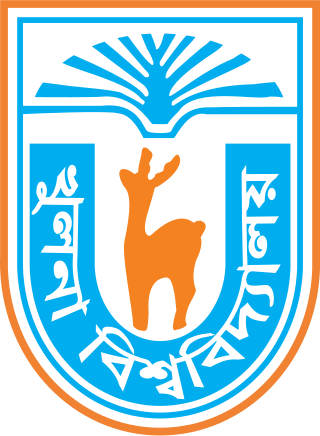A bachelor's degree or baccalaureate is an undergraduate degree awarded by colleges and universities upon completion of a course of study lasting three to six years. The two most common bachelor's degrees are the Bachelor of Arts (BA) and the Bachelor of Science. In some institutions and educational systems, certain bachelor's degrees can only be taken as graduate or postgraduate educations after a first degree has been completed, although more commonly the successful completion of a bachelor's degree is a prerequisite for further courses such as a master's or a doctorate.

The University of Zimbabwe (UZ) is a public university in Harare, Zimbabwe. It was opened in 1952 as the University College of Rhodesia and Nyasaland, and was initially affiliated with the University of London. It was later renamed the University of Rhodesia, and adopted its present name upon Zimbabwe's independence in 1980. UZ is the oldest university in Zimbabwe.
A Bachelor of Technology is a bachelor's academic degree that is awarded for an undergraduate program in engineering.

The Open University of Sri Lanka is a national university in Sri Lanka. It is unique within the Sri Lankan national university system for being the only university to offer programs of study leading to certificate, diploma, degrees and postgraduate degrees up to PhD level through the Open and Distance Mode of Learning (ODL). The degrees awarded by the university are treated as equivalent to degrees awarded by any other Sri Lankan University under the preview of the University Grants Commission.
A Doctor of Pharmacy is a professional doctorate in pharmacy. In some countries, it is a proficient graduate degree to practice the profession of pharmacy or to become a clinical pharmacist. In many countries, people with their Doctor of Pharmacy are allowed to practice independently and can prescribe drugs directly to patients. A PharmD program has significant experiential and/or clinical education components in introductory and advanced levels for the safe and effective use of drugs. Experiential education prepares graduates to be practice-ready, as they already have spent a significant amount of time training in areas of direct patient care and research.

Khulna University is a public research university at Gollamari in Khulna, Bangladesh. It was established in 1991.

Dibrugarh University is a collegiate public state university in the Indian state of Assam. It is the second oldest University in Assam and in North East India. It is a member of the Association of Indian Universities and Association of Commonwealth Universities. It is located at Dibrugarh, Assam, India. It was set up on 1 July 1965 under the provisions of the Dibrugarh University Act, 1965 enacted by the Assam Legislative Assembly. The University was established to build it as a Center of Science and Technology. As the University was planned as a centre of higher education in science and technology, Bhoj Raj Seth, an eminent mathematician of the Indian Institute of Technology, Kharagpur, was appointed as the first Vice-Chancellor at the initiative of the then Education Minister of Assam, Dev Kant Barooah.
A Bachelor of Pharmacy is a graduate academic degree in the field of pharmacy. In many countries, this degree is a prerequisite for registration to practice as a pharmacist. Since both PharmB and PharmD are prerequisites to a license in most Western countries, they are considered equivalent. In many Western countries, foreign graduates with BPharm, PharmB, or BS Pharm practice similarly to PharmD graduates. It is analogous to an MBBS vs. an MD, where MBBS is the foreign equivalent of an MD. The degree provides training to understand the properties and impacts of medicines and develop the skills required to counsel patients about their use.

Midlands State University is a government owned university in Zimbabwe. The university has 9 faculties offering a wide variety of courses and many specialist programmes. The university is accredited through the National Council for Higher Education, under the Ministry of Higher and Tertiary Education of Zimbabwe.

National Institute of Pharmaceutical Education and Research, S.A.S. Nagar, also known as NIPER Mohali, is the Topmost Pharmaceutical research institute in India & the main campus of the group of seven NIPER institutes, under India's Ministry of Chemicals and Fertilizers. The institute offers Masters and Doctoral degrees in pharmaceutical sciences. As an Institute of National Importance it plays an important role in the Human Resource Development for the ever-growing Indian Pharmaceutical industry, which has been at the forefront of India's science based industries with wide-ranging capabilities in this important field of drug manufacture. The institute offers a 2-year PG degree & 4-5 year PhD Courses in 13 disciplines;
Harare Polytechnic College, formerly Salisbury Polytechnic and commonly referred to as Harare Polytechnic, is a technical, public research university in Causeway, Harare. The university is known for its strength in science and engineering, and is one among a small group of technical schools or institutes of technology in Zimbabwe which are primarily devoted to the instruction of pure and applied sciences. The school was founded on the British polytechnic model offering standard and higher diplomas and undergraduate degrees, unlike European and American institutions which often offer postgraduate degrees and a strong emphasis on research. At the outset, the focus of polytechnics was on STEM subjects with a special emphasis on engineering.
The basic requirement for pharmacists to be considered for registration is often an undergraduate or postgraduate pharmacy degree from a recognized university. In many countries, this involves a four- or five-year course to attain a bachelor of pharmacy or master of pharmacy degree.

Dharmsinh Desai University (DDU) formerly known as Dharmsinh Desai Institute of Technology (DDIT) is a private institution in Nadiad, Gujarat and was founded on 2 January 1968.

The School of Electronic and Communications Engineering (SECE) at the Dublin Institute of Technology (DIT) is one of the oldest schools of communications and electronic engineering in Ireland, with the first courses in wireless telegraphy inaugurated in 1911.

A Bachelor of Science is a bachelor's degree that is awarded for programs that generally last three to five years.
The National University of Science and Technology (NUST) is the second largest public research university in Zimbabwe, located in Bulawayo. It was established in 1991. On 8 April 1991, NUST opened for the first time with 270 students in three faculties. The number of academic staff was 28.
Ramaiah University of Applied Sciences (RUAS) is a private university in Bangalore, India. It was created by an act in the State of Karnataka, India and was established in December 2013.

The Dublin Institute of Technology (DIT) School of Electrical and Electronic Engineering (SEEE) was the largest and one of the longest established Schools of Electrical and Electronic Engineering in Ireland. It was located at the DIT Kevin Street Campus in Dublin City, as part of the College of Engineering & Built Environment (CEBE).

The Gampaha Wickramarachchi University of Indigenous Medicine, is a public university located in Yakkala, Sri Lanka. It was established by Ayurveda Cakrawarti Pandit G.P. Wickramarachchi in 1928 as the Gampaha Sidayurveda Vidyalaya and in 1982 it was incorporated as Gampaha Wickramarachchi Ayurveda Vidyalaya under the Ministry of Indigenous Medicine.











